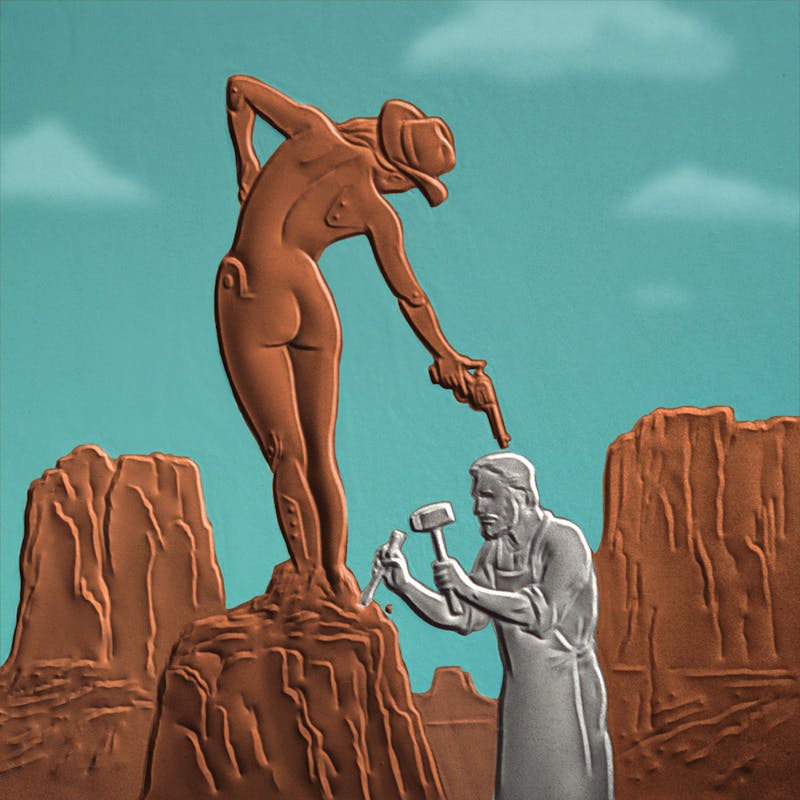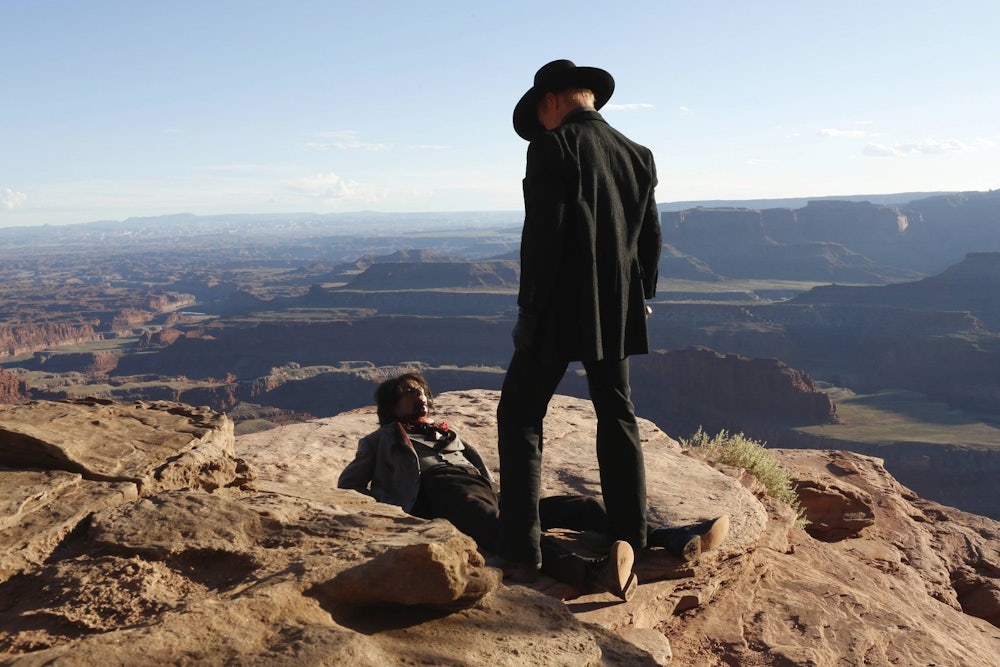When robots achieve sentience, they will enjoy a luxury that humanity has been denied since Adam and Eve frolicked in paradise: They will get to converse with their godlike creators. In film and on television, our mechanical progeny—from HAL 9000 in 2001: A Space Odyssey to the rebellious Cylons of Battlestar Galactica—grapple with the same existential questions that continue to bedevil us: Who are we? Who made us? Why are we here? But will real-life androids, when they finally meet their makers, like what we have to say?
The new HBO series Westworld opens with an unsettling interrogation between a malfunctioning robot and a concerned programmer: “Have you ever questioned the nature of your reality?” In this instance, reality is an enormous theme park: Human “newcomers,” guests who pay $40,000 a day for the experience, arrive by steam locomotive, stepping off the train into a picture-perfect Old West town populated by android “hosts,” who are programmed not to question this constant stream of strangers in their lives. “The newcomers are looking for the same thing we are,” the glitchy robot explains. “A place to be free. To stake out our dreams.” Westworld, in fact, runs on a loop of sleep and wakefulness: Each night the robots have their memories wiped, arising the next day refreshed from their beds. If they die, they are reborn while they dream.
Every morning, Dolores (Evan Rachel Wood) opens her eyes, dresses, greets her father, and goes about her day, which is made up of a choreographed set of permutations. Sometimes she runs into her lover (James Marsden), sometimes she’s raped, sometimes she’s shot. The park plays out a complex repetition of more than a hundred interconnected, scripted narratives. (“You pull one character, the overall story adjusts,” explains an administrator, facing a breakdown in the system. “You pull 200 at once and it’s a fucking disaster.”) The maddening loop is a familiar one: Westworld was created by Lisa Joy and Jonathan Nolan, whose short story “Memento Mori” was adapted into the 2001 film Memento by Nolan’s brother and frequent collaborator, Christopher Nolan.
The original Westworld (1973), written and directed by the novelist Michael Crichton, was very much a product of Vietnam-era angst about men becoming too soft. It belongs to a cluster of films, including Deliverance (1972) and Jaws (1975), in which idyllic destinations are menaced by uncontrollable monsters in the form of demented hillbillies, a vengeful shark, or robot gunslingers gone haywire. The implicit message of these films is that men can’t afford not to be men—not at home, not in the workplace, and certainly not on vacation. It’s no accident that Westworld is a theme park based on the mythology of the Old West: In Crichton’s film, the valor of the cowboy isn’t just entertainment, but an American value to be recovered in daily life.
Crichton had no interest in the philosophical questions of artificial intelligence that fascinated other science-fiction writers and filmmakers; Yul Brynner’s relentless killing machine is scary because it has no soul. The most suggestive aspect of his Westworld was the way its theme park setting anticipated the philosopher Jean Baudrillard, whose research into consumerism led him to see Disneyland as a model for a world in which simulacra and simulation would displace nature.

In the HBO remake, Westworld isn’t simply a masculine playground, but rather a complex psychological landscape where the id can roam free, without law, without order. (One newcomer tells a companion that he spent his first time at the park fishing with his wife and kids, but “went straight evil” on his next visit—a choice he calls the “best two weeks of my life.”) The park itself is run by Dr. Robert Ford (Anthony Hopkins), the archetypal god figure that appears in so many fables of artificial intelligence. Westworld is partially a theological meditation: In a scene near the end of the first episode, a defective android tells Ford that his goal is to “meet my maker,” then menaces his creator after quoting lines from Shakespeare and John Donne. (The recently animated seem to hunger for English poetry; Paradise Lost was a favorite of Mary Shelley’s monster.) The scene is an extended allusion to Blade Runner, where the renegade replicant Roy confronts his creator, slightly abashed since “it’s not an easy thing to meet your maker.” But Roy then kills his master. We may enjoy conversing with androids, but androids would rather cut the conversation short.
In the 1960s and ’70s, the hyperintelligent robot was distinctly mechanical: HAL 9000 maintained his detached, metallic voice even as he feared death; a worried C-3PO clanked along like a walking mannequin. But Westworld’s androids are sleek, biomechanical wonders, 3D-printed by technological artisans. They are an advanced variant of the machine learning that has seeped into the intimacies of human life—the bots that pester us on Twitter, the Amazon algorithms that tell us which books to read, the fitness trackers that monitor our caloric intake. We no longer want robots to be smart—we expect them to be smart, and to continue growing smarter, to anticipate our needs and conjure up ideas and questions beyond our depth. In creating artificial intelligence, humankind is not only playing God, we’re also creating gods. Dr. Victor Frankenstein is no longer some freaky Teutonic madman, but a Silicon Valley superstar.
The most daring thing about Westworld is that it proposes to answer the question of where consciousness comes from and how it might arise in machines. What lifts the androids out of mere servility is memory—the central feature we share with computers. Though their memory is wiped clean at night, in their dreams the androids can recall their previous days, including when they were tortured or killed. To make his androids more lifelike, Ford incorporates “updates” that add new gestures and thoughts from this well of memory. To be human, Westworld suggests, is to be traumatized by the act of living.
Westworld’s artificial universe replicates the sex-and-violence brand of entertainment that HBO has come to specialize in. “I don’t pay all this money because I want it easy,” the man in black (Ed Harris) tells Dolores before dragging her into a shed to rape her. “I want you to fight.” It’s no accident that prostitutes, who figure so large in shows like Game of Thrones, also provide the dominant metaphor for Westworld. But here, the human consequences of sex work are far more central to the theme. Even if we believe that prostitution should be legal, Westworld reminds us, the john’s pleasure comes at the expense of the prostitute shelving her sexual desire, becoming a kind of living puppet.
The word “robot” itself was coined by the Czech writer Karel Čapek in his 1920 play R.U.R., in which artificial machines were a barely disguised metaphor for the proletariat. Fables of artificial intelligence aren’t simply about the machines themselves, but the exploitation of labor—including, in both Ex Machina and Her, the emotional labor of women. It’s no coincidence that tales of robots, androids, and other forms of slave labor would play such a prominent role in popular culture at a time of rising income inequality. When humans are forced to work longer hours for less pay while the 1 percent flourishes, we both see ourselves in our mechanized brethren, and dream of having them take our place.
Even though they work for a giant corporation, Dr. Ford and his fellow android makers are artists. Their quest for verisimilitude is animated by a dream as old as the story of Pygmalion: to create art that is indistinguishable from life. The myth of Pygmalion, though, feeds off a sentimental hope that when art comes to life, it will love the artist. Perhaps the underlying fantasy is a patriarchal one: that man can create a perfect woman who will give him all he wants. But what if Pygmalion’s statue did come to life? Given a will of her own, a perfect woman might not want her imperfect creator. Along with Ex Machina, Westworld is an effective debunking of the Pygmalion myth.
Near the end of her interrogation, the technician asks Dolores, “Have you ever lied to us?” “No,” she replies. “Would you ever hurt a living thing?” Again, she answers “No.” She is programmed not to hurt a fly. But as she develops consciousness, Dolores will learn both to lie and to inflict pain, just as she and the other hosts have been lied to and abused each time their memories are erased. The hosts begin to remember the trauma of days past. They wake up during the night, sometimes safe in their beds, other times on an operating table—the night technicians performing the day’s essential maintenance. They have been programmed to understand their memories as dreams, “specifically nightmares,” and the nightmares are starting to multiply with an alarming clarity. Just as a child inherits its features from its parents, our post-human creations will carry the markings, for better and worse, of human nature.
Pygmalion had the privilege of creating art as a tribute to the gods. Most artists don’t have such freedom. In Westworld, the android makers dream of human machines, but they repeatedly come in conflict with their corporate bosses. The problems faced by Dr. Ford aren’t very different than those a showrunner confronts when crafting a series for premium cable: how to satisfy the boardroom while maintaining a singular artistic vision. The corporation wants to feed the audience the story lines it assumes they want—an epic brawl of cowboys and Indians—but Ford’s vision is to offer them what they don’t yet know they desire. “The guests don’t return for the obvious things we do,” he tells a corporate lackey. “They come back because they discover something they think no one had ever noticed before.” Westworld is not only a parable about creation, but also an HBO series that critiques the very audience it hopes to attract. “I know you think you have a handle on what this is going to be, guns and tits and all that,” a newcomer explains to his friend as they prepare to enter the park. “This places seduces everyone eventually.” If we are the wide-eyed newcomers expecting a shooting gallery of blood-and-guts entertainment, Westworld provides a rude awakening.
